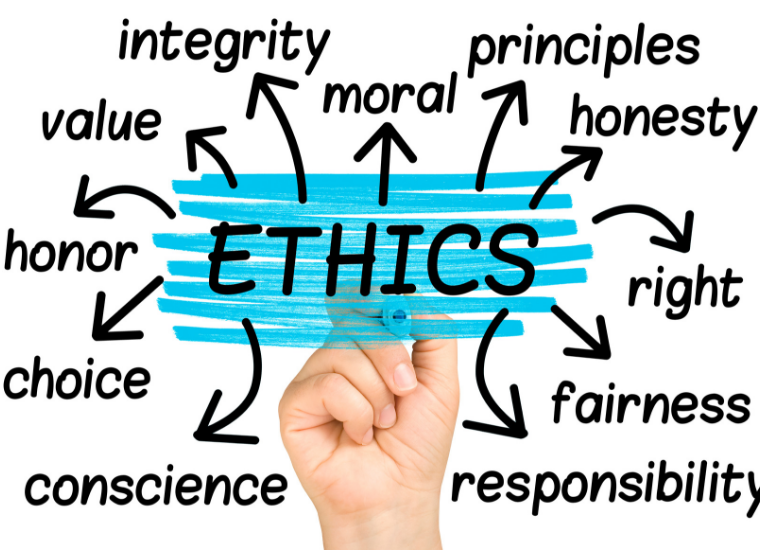
Ethics in Life and Business
We are all encouraged to make ethical choices and apply ethics in all areas of our lives. But what does ethics mean, and why do ethics matter for business?
We can think of ethics as the principles that guide our behavior toward making the best choices that contribute to the common good of all. Ethics is what guides us to tell the truth, keep our promises, or help someone in need. There is a framework of ethics underlying our lives on a daily basis, helping us make decisions that create positive impacts and steering us away from unjust outcomes. Ethics guides us to make the world a better place through the choices we make.
Ethics in business is just as important as ethics in personal life. Business leaders have a unique role and a great responsibility in shaping the ethical culture of their businesses, and thereby influence their broader communities as well.
Key Questions to Ask
Business leaders may not set out to define the ethical culture of their businesses but they inevitably do. Here are a few key questions to consider to bring ethics into your business mindset:
- How do I define the common good for my business? What does it mean for my customers, my employees, the community where my business is located, my investors, and my supporters?
- How do I make good ethical decisions? How do I analyze a situation and make a decision that positively contributes to the common good?
- How can I influence the character of my business?
- What kinds of structural conditions or company policies do I need to put in place to create an ethical culture?
- How will I monitor the ethical culture of my business?
- How will I address or correct unethical behavior in my business?
How Ethics May be Tested
Business leaders, and entrepreneurs especially, are under tremendous pressure and can face very significant ethical challenges. Here are a few examples of how unethical decisions arise for entrepreneurs:
- If I exaggerate the number of customers or orders I have, I could attract more investors and get better funding.
- If I tell customers all the features on our product roadmap are available now, I could close more deals.
- I can save some money if I choose a production facility that does not abide by environmental laws.
Ethics and Social Responsibility
Social responsibility is the idea that an individual (or organization) has an obligation to act for the benefit of society at large. Today, social responsibility has become an important part of culture at businesses of all sizes. TOMS Shoes is an excellent example of a business that prioritizes social responsibility. TOMS was founded with the commitment to provide a new pair of shoes for a child in need for every pair of shoes purchased. The company has now expanded to support other causes such as safe water, mental health, and equality. TOMS Shoes’ inspirational tagline “Stand for Tomorrow” communicates its dedication to social responsibility in just three words.
Social responsibility can be practiced in big or small ways every day. Businesses can volunteer with local organizations, donate funds to a chosen cause, sponsor a neighborhood group or sports team, and much more. Even planting flowers, applying a fresh coat of paint, or picking up trash in front of your store has a positive impact on the community surrounding your business. When businesses give back, they not only contribute to the common good, they engage with their communities in meaningful ways, build morale among employees, and create positive regard for the business.
Ethics When Things Go Wrong
It is not easy to handle a business crisis, but avoiding it or postponing a response could make it worse. Businesses should think ethically when coming up with a plan to handle an ethical crisis. In other words, act in a way that promotes the greatest common good and encourages trust rather than diminishing it.
Some situations may warrant the advice of a lawyer and a crisis expert. Here are some general practices that could be followed:
- Be open and transparent
- Prioritize those impacted by the situation
- Apologize
- Fix the problem
Source: "Principles for Handling Ethics Crises," Kirk O. Hanson, senior fellow of the Markkula Center for Applied Ethics at Santa Clara University and former executive director of the Center
Ethics is a Lifestyle
Ethics has influence over the decisions we make and the actions we take, from our personal lives to our professional careers, and beyond. We are all part of an interconnected global community. Our contributions to the common good, no matter how big or how small, can have a lasting impact. Choosing an ethical lifestyle will ensure our impact is positive. Business leaders have a unique opportunity to create and influence the ethical culture of their businesses and among their stakeholders. Even bringing ethics into your business mindset will help you approach situations in a more ethical way. And if you are unsure how to create an ethical culture in your business, leading by example is a great way to start. It’s a simple as be good, do good.
Interested in MOBI's FREE Online Entrepreneurship Courses?